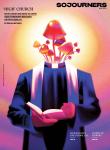Musician Derek Webb, who started out with the band Caedmon’s Call in the 1990s, has “spent a career gnawing on the hand that feeds me in the evangelical Christian world,” he told Sojourners.
From his time in Caedmon’s Call to his work as a solo artist for the past 20 years, Webb has outlined a winding and vulnerable journey of doubt, love, grief, and freedom. Most recently, Webb has been reckoning with his evangelical past, writing what he calls his “first Christian and Gospel album in a decade.”
In his April album, The Jesus Hypothesis, Webb demonstrates his ever introspective and thoughtfully provocative lyricism with lines like, “Maybe black sheep are not lost oh, they’re just pioneers / Just brave enough to wander off and find what’s past our fears.”
Sojourners editorial fellow Joey Thurmond spoke with Webb to hear why he’s making music for evangelicals again, how he’s intentionally scaled down his career, and what he thinks drag queens can teach Christians about the love and incarnation of God.
This interview has been edited for length and clarity.
Joey Thurmond: For those who aren’t familiar with your story, what are you all about?
Derek Webb: I’ve been a singer/songwriter for 20 years as a solo artist. And then 10 years before that, I was in the band Caedmon’s Call. Over the years, my music has veered in and out of evangelical spirituality and politics. I’ve continued to put records out and tour, but I stay off the grid. I have acclimated to writing very specific and nuanced soundtracks for a very particular group of people, mostly those with evangelical or post-evangelical spirituality. I have been a Christian at different seasons of my life. I don’t identify that way currently, but I definitely care a lot about the space.
You’ve described your new album, The Jesus Hypothesis as your “first Christian and gospel album in a decade.” You also reunited with Caedmon’s Call recently. What brought you back to the Christian and Gospel genre?
I have always approached the Christian category as more of an assigned meaning or a marketing term. When I was an evangelical and growing up, it seemed you would apply the term “Christian” to a bookstore and then, suddenly, everything in that bookstore was right, true, good, beautiful. It was safe; it was pre-vetted for your spiritual nourishment. That category can’t possibly mean that when it’s applied to anything other than people. It’s just a rubber stamp that we give things, and then it tends to somehow encourage people to turn off their powers of discernment and to consume at will, which is extremely dangerous.
[The album is] about me going back into a season of “deconstruction” 10 years ago. The Jesus Hypothesis was me wanting to go back into that place and look for meaning and truth and beauty and things I wanted to bring with me; going back and sitting in the rubble of deconstruction and reexamining and poring back over those issues. And I thought, “Who is this for if not for Christians?” If ever I’ve had a record that makes sense in the Christian and Gospel category, my God, it’s this one. I put it there because that’s who I hope finds it.
The thing that led [Caedmon’s Call] to working together again last year was that it was the 25-year anniversary of our self-titled record … and it was out of print. We couldn’t re-release it anywhere because we don’t own it. And we thought, “Could we pull a Taylor Swift and rerecord the whole thing now and just release it again?” And it turns out we could do that. All of a sudden, it looks like I’m active in the Christian music world!
Artists like Julien Baker, Semler, and others seem to represent a growing audience for former evangelicals and “deconstructing” Christians. Do you make anything of this rising trend in relation to the Christian music industry?
You’re seeing what’s coming out of the ground from the seeds that were planted for a lot of these folks who grew up with a lot of Christian music. A lot of what came out of the last 20 years of evangelical culture — it hasn’t all been good. You’re now seeing a lot of folks of a certain age who are exploring how they got into it, their presumptions are about their beliefs, how they found those things, and reckoning with the way they see the world as young adults. These artists who are really being extremely honest and very gritty about their experience growing up feels like a natural consequence of the last 20 years.
The more voices we can have applied to evangelical Christianity, especially the voices of people who the church has traditionally marginalized, like women, minorities, and queer people, [the better.] It’s essential that we have and heed the words of people like the artists you’ve mentioned and more. I want to contribute, but I also want to ease carefully into it because I’m a cisgender straight white man who’s been in it for 30 years. I’m trying to contribute something meaningful and disruptive, but what’s more important and interesting are the voices of people like Maddie Zahm and Semler and boygenius.
You mainly perform at small venues and people’s homes. How has that influenced your relationship to your fanbase?
What I’ve learned over the years is you have to be really careful when you’re a professional autobiographer, especially if you accept any prophetic-type or speaking-truth-to-power angle to what you’re doing. If that’s a thing you take seriously, you have to be really careful how you scale.
As an independent singer-songwriter, I want as many people as possible to hear my music. That said, if you’re not careful, what happens is you start with a spark of an idea and maybe a good intention. And then it works and it takes off a little bit — this is what happened for Caedmon’s Call; you start to get popular, all of a sudden you’re signing a record deal, and you’re playing concerts for more and more people. The temptation is to suddenly get into the platform building and maintenance business. If you continue to make choices based on the things that were important to you at the start — the disruption of the status quo, getting down into the nuance of thought where the real grit is — you’re going to see your popularity wane a little bit. And then you make some compromises, and it starts to work a little bit, and the platform gets a little higher. [Eventually], the incentive for you to get up on that platform and say something disruptive goes down sharply.
I figured out a way to make a financial model out of house shows, out of playing for 40-60 people a night. That’s why I started my Patreon. I have 300-400 people who I actually know. I spend 20-30 minutes just catching up on our lives. When I’m making records and I’m writing songs, I think about what matters to them. What soundtrack do they need? What is it that we have in common that’s important, that will make them feel less alone in the experience of their life — as it pertains to spirituality and everything else? If all I have is my little group of patrons and my little house shows, I can make a living at this for the rest of my life.
What’s a story you’d highlight from your community?
Almost every night when I’m doing shows, somebody will ask for a song. And it can be from anywhere in my catalog over the last 30 years. At the end of the day, what I tell people is that I am not the man who wrote the songs on Mockingbird; I’m not the person who wrote those Caedmon’s songs. What person who you could consider trustworthy and healthy still believes and agrees with 100 percent of what they did 10-20 years ago? However, I trust that earlier version of myself stood where he stood, looked at the world with the information that he had and tried to describe it for us. I think he did the most honest job that he could, and I will therefore cover his material.
I can think of playing a house show in Waco, Texas. There was a guy with his young wife and new baby, and he asked me to play a particular song he said [was] literally the difference, in a vulnerable moment, that kept him from taking his life 10 years ago. And he happened to stumble on a particular song at that moment, and he heard me telling my story of having screwed my life up in very similar ways. Half the room was tearful hearing the story, and it was hard to play the song, because it was such a moment for all of us. The fact that there are those moments — and they happen all the time — just shows why I stick it out.
You say your job as a musician is “seeing and describing the world.” How are you doing that through The Jesus Hypothesis?
I don’t think every artist has to accept that as their job description, but I like it. And what’s tricky about it is that every variable in that description is always changing. The world is always changing, and I am always changing as I try to describe it.
“Deconstruction” has been a little co-opted and I don’t know what the word really means. I’m not sure what people hear when I use it. I don’t want to use it. But [deconstruction] is the audit of all your presumptions about invisible reality; it’s hypothesizing about spirituality rather than believing things about spirituality. And I’ve always said that when it comes to invisible things like God, or unknowable things like the future, uncertainty is a pretty good way to go. And that’s why I don’t really put the term “belief” on stuff so much anymore. I hypothesize about things in real time, and I bring with me what rings true and what makes sense.
I think a lot of people when they go through — let’s again say “deconstruction” — they say, “Oh, this is so great because now I’m just open; I’m open to anything now.” But often what goes without saying is that they’re open to anything other than the thing that they just deconstructed. And I get that. But for me, God doesn’t get everything in the divorce. I don’t wanna leave things behind that are true and meaningful and real.
Flamy Grant, who is on The Jesus Hypothesis, is the first guest musician amid your solo discography. What led to that collaboration?
Flamy Grant is an incredible, freakishly talented musician and drag queen in San Diego and a great dear friend of mine. I was touring through Southern California, and Matthew, who is Flamy’s “counterpart” asked me to come be on his podcast, Heathen Happy Hour. We connected, and I just love Matthew so much.
I only make topical albums. I would rather say one thing 10 ways than say 10 things. The theme of [The Jesus Hypothesis] is going back in, sorting through the rubble to find meaning and beauty. But there’s always a second thing that’s almost just as important. On The Jesus Hypothesis , it’s absolutely issues of gender identity and sexuality. And there’s this song on the record called “Boys Will Be Girls.” I wrote it for a dear person in my life who came out to me just a few years ago. And I think I was one of the very first people they told, and I was really moved by their vulnerability and their trust, and so the song is just my response to that friend. And so, the idea [from Flamy Grant] came up: Let me perform the video to the camera as though it’s my mirror while being put in drag.
Especially with what’s happening in my home state of Tennessee and what’s happening all over the country with so many laws we’re seeing being rolled back – protections for the queer community. I don’t wish for there to be battlelines around issues like this, but if there are, I’ve always wanted to be very clear where I stand. That’s exactly the kind of trouble I like to stay in. And ironically, the kind of trouble I see Jesus getting into: standing with the people whom arrogant church people judge, marginalize, and pursue with violence.
What can the church learn from supporting and being with LGBTQ+ people?
Jesus’ whole life was getting into trouble because he so deeply identified with — lived his life with — people who were, by the culture at that time, seen as the most complicated. He was even called by “the sins” of the people who he was loving and spending his life with. His reputation was ruined as a result of the people to whom he was an ally in that time and place.
People say you can see Jesus in the lives and actions of people who claim to follow him. I don’t know if that’s where I am at this point, but if I do have moments of identifying that way or resonating with Jesus — I have followed him right into a wig and a dress. There is something about the experience of being put in drag by Flamy Grant that did feel incarnational to me. And I think that’s a great analog to the work that Jesus did, and the power that incarnational risk has.
What advice would you pass on to people who are considering, struggling with, or have walked away from the Christian faith?
One of the hardest things that a lot of my friends have had to relearn is to get back in touch with their bodies, and to trust their bodies and their gut again, because the church systematically teaches people to hate and distrust themselves. It’s literally in the pitch for evangelical Christianity: “If there’s a thing in your heart that you really want, that’s for sure the worst thing and the last thing you should do.” I would tell people, above all else, learn to trust your gut and your body again. Because that’s your intuition. That’s the Spirit!
I would tell people that finding safe friends to go through this with is hugely important. And that you don’t have to hate who you were to love who you are. Sometimes you have to make a hard break and know where it ends, so don’t be in a rush about it. Maybe you don’t need to go back. But you’re able and welcome to do that. That’s the whole Jesus Hypothesis thing: You can bring with you things that were part of your identity before, but you can repurpose, redeem, restore, and bring forward those things.
Got something to say about what you're reading? We value your feedback!








